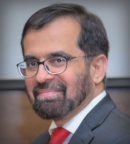
Tahir Shamsi, MBBS, MRCPath, FRCPath
Although bone marrow transplantation is routinely employed in the United States and other wealthy nations, this costly life-saving procedure has struggled to gain a foothold in many low- to moderate-income countries, where resources are triaged to make the best use of precious health-care funding. With unflagging dedication, Tahir Shamsi, MBBS, MRCPath, FRCPath, introduced bone marrow transplantation to Pakistan in 1996, becoming the nation’s leader in treating hematologic malignancies. Dr. Shamsi died at Aga Khan University Hospital in Karachi on December 21, 2021, after a brain hemorrhage. He was 59 years old.
Breaking From Family Tradition
Dr. Shamsi was born on February 18, 1962, in Karachi, shortly after his parents had migrated there from Delhi. He was the eldest of six siblings, with two brothers and three sisters. Although the family was deeply business oriented, Dr. Shamsi followed an early passion for science into a career in medicine.
A devout Muslim, he was said to have memorized the Quran by age 8. After graduating high school with honors, he pursued his ambition to become a doctor, attaining his medical degree in 1988 from Dow Medical College, a public medical school in Karachi. After attaining his medical degree, he went to London, where he received his postgraduate degree from the Royal College of Pathologists.
Dr. Shamsi eventually returned to Pakistan and began setting up a cancer care program at Ziauddin Hospital, where he trained many medical professionals in hematology, as well as stem cell transplantation and research. In 1995, he performed the first bone marrow transplant in Pakistan while treating a 19-year-old patient with blood cancer in Karachi.
In 2011, Dr. Shamsi established Pakistan’s National Institute of Blood Disease and Bone Marrow Transplantation in 2011 and was a fellow of the United Kingdom’s Royal College of Pathologists. In recognition of his services, a lifetime achievement award was conferred on him by the Dow Graduates Association of North America in 2016. During his career, he performed 650 bone marrow transplants and was the author of more than 100 research articles.
Innovator in Health Care
“Dr. Shamsi was part of the first major attempt to train gynecologists in blood diseases and prenatal care, an initiative that was gaining ground,” said his colleague Nazli Hossein, MD. “He also conducted extensive research in thalassemia, which was internationally recognized and eventually led to a treatment that allowed patients to lead healthy lives without the need for blood transfusions.”
Dr. Hossein noted that during the ongoing coronavirus public health crisis, Dr. Shamsi was a leading advocate and medical practitioner who used a method of plasma therapy for patients with COVID-19. He appealed to the Pakistani government to adopt this method during the pandemic, and since then, more than 200 patients with COVID-19 have been treated with plasma therapy in Pakistan. Under his guidance, clinics quickly began adopting measures to contain the pandemic, an effort that is credited with saving countless lives.
Fitting Tributes
Pakistan Medical Association Secretary General Qaiser Sajjad, MBBS, DLO, MS (ENT), noted: “Dr. Tahir Shamsi’s death is an irreparable loss for the community. He did an excellent job of establishing a bone marrow transplant facility in the country.” Dr. Sajjad added that along with his medical accomplishments, Dr. Shamsi was a “thorough gentleman” who was “very humble, cooperative, and supportive” with his patients.
Pakistan President Arif-ur-Rehman Alvi expressed his condolences on the death of the renowned doctor and prayed for the “departed soul and strength for his family to bear the loss.” The president also took to his official Twitter account to state that Dr. Shamsi had “rendered outstanding services in the field of medicine and research and will be remembered for his services in bone marrow transplant and other leukemia treatments.”
One of his many mentees, Uzma Zaidi, MBBS, FCPS, of the National Institute of Blood Diseases and Bone Marrow Transplantation, said: “He was a great scientist, a philanthropist, and a visionary person. I was lucky to be his trainee/resident during my first and second fellowship training program and then got the opportunity to work with him as a transplant physician. As a mentor, he was a role model for all his students, always approachable, nurturing his students to become independent yet offering his support all the time. He used to invest in our success happily and always felt accomplished by seeing us growing in our careers. He was always respectful and insightful toward his mentees.”
Dr. Zaidi added: “He took my career to the next level. He completely transformed my personality, my perspective toward life. He not only taught me hematology, but also taught me the real meaning of life—how to be a good person; how to behave with people, patients, and peers; and how to be generous to others.”
Noted bone marrow transplant physician Tasneem Farzana, MBBS, also of the National Institute of Blood Diseases and Bone Marrow Transplantation, said: “I joined Dr. Shamsi in 1997 as a postgraduate fellow. I always found him to be a wonderful person. He had a cool, controlled temperament and was humble, down-to-earth, and sophisticated. I used to call him “Boss” or “Sir Jee” [Jee is a term of respect]. He had a very empathetic and sympathetic personality and was very soft spoken.”
She continued: “Dr. Shamsi was a classic example of someone who treats the janitorial staff the same way he treats the CEO, a dependable and commendable person in both personal and professional matters, and had outstanding leadership qualities. He was dynamic, innovative, highly inspirational, motivated, and intelligent. He introduced hematology—and clinical hematology, in particular—as a separate discipline on both graduate and postgraduate levels. Before him, clinical hematology was in a primitive shape in Pakistan, and bone marrow transplant was totally nonexistent.”
Dr. Shamsi was married in 1990 and is survived by his wife, Uzma Tahir Shamsi, as well as two sons, Usama and Umer, and three daughters, Tooba, Mahnoor, and Zoha.

